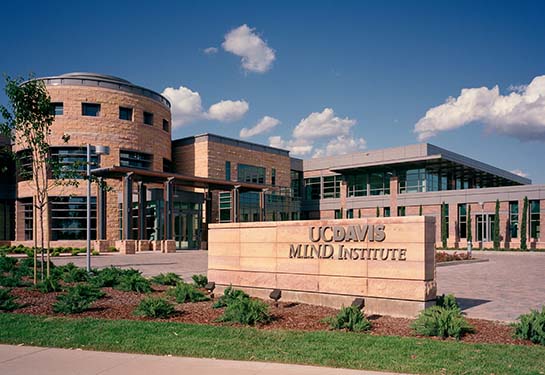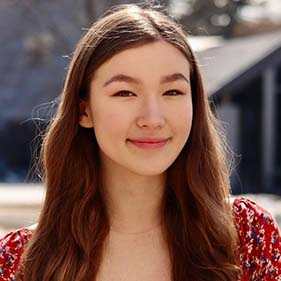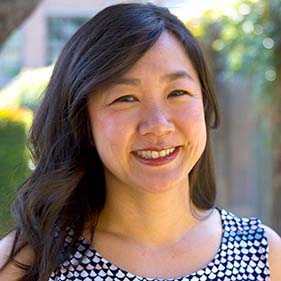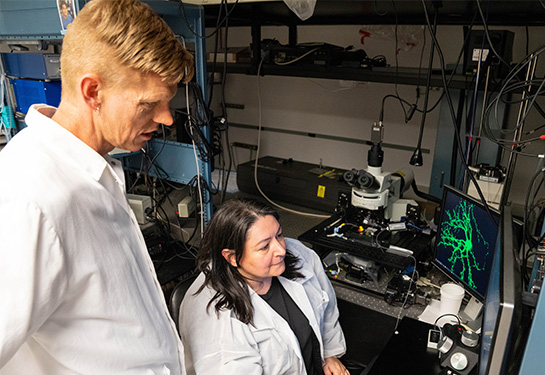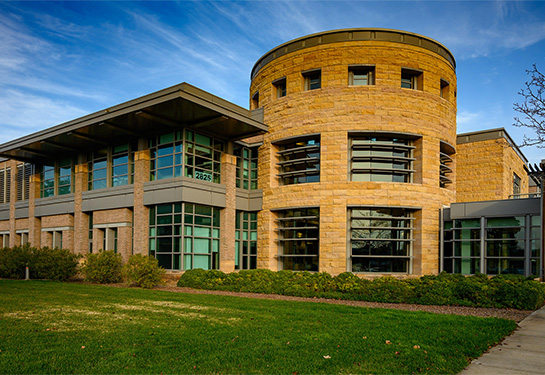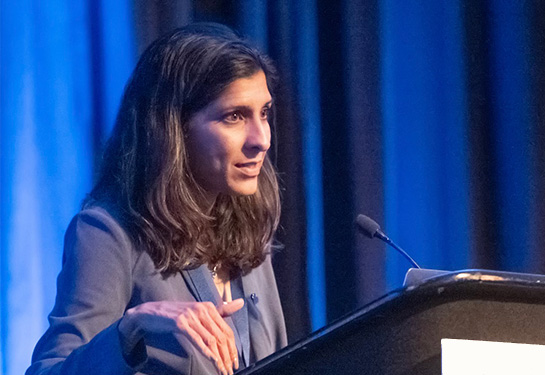MIND Institute program gives undergraduates research experience in autism, mental health
CDC-funded RISE-UP program is focused on reducing health disparities in maternal and child health
A summer program at the UC Davis MIND Institute aimed at eliminating health disparities is now accepting applications.
MCHC/RISE-UP (Maternal Child Health Careers/Research Initiatives for Student Enhancement – Undergraduate summer Program) is for undergraduates and recent graduates who are interested in serving historically underrepresented communities. The goal is to increase the diversity of public health professionals focused on maternal and child health and neurodevelopmental disabilities.
The program is in its fifth year and is funded by the Centers for Disease Control and Prevention (CDC) through the Kennedy Krieger Institute in Baltimore. The MIND Institute and the UC Davis Office for Health Equity, Diversity and Inclusion host the program in Sacramento, one of several sites nationally. Other partners include the Johns Hopkins School of Medicine and the University of South Dakota.
A pathway promoting health equity
The program is intended for juniors, seniors and first-year post-baccalaureate students who are interested in medicine, psychology, social work, nursing and research focused on neurodevelopment or mental health.
“In these very specialized fields, we find that the higher you go in terms of education, the less diverse the group of professional providers is,” said the MIND Institute’s Janice Enriquez, co-director of the program and associate clinical professor in developmental and behavioral pediatrics. “We’re hoping to nurture a diverse, culturally and linguistically competent generation of students inspired to pursue these careers in the future.”
RISE-UP was my top summer internship choice. It was a collaborative, intersectional program where I could explore medicine and disability justice and learn more about uplifting disabled communities in health care.” —Aubrianna Wilson
One of those students is Aubrianna Wilson, a junior at Middlebury College in Vermont who’s majoring in neuroscience with a minor in global health. She took part in RISE-UP last year and is passionate about social justice.
“RISE-UP was my top summer internship choice. It was a collaborative, intersectional program where I could explore medicine and disability justice and learn more about uplifting disabled communities in health care,” she explained.
Wilson identifies as disabled and is a first-generation college student.
“I’m the youngest of three siblings and the first to graduate high school, so I have had to navigate much of higher education alone. RISE-UP has gifted me with truly impactful opportunities.”
Research and community engagement
Last year, RISE-UP was virtual, but the plan is to host it in person this summer. Scholars will take part in an orientation at the Kennedy Krieger Institute, spend a little over a month in Sacramento, then travel to the CDC for a final event.
MIND Institute RISE-UP scholars take part in seminars about public health, autism and other neurodevelopmental disabilities and mental health conditions as well as health disparities in the field.
“They learn from scientists, clinicians, faculty, staff, public policy leaders in the disability advocacy system and community members,” Enriquez said.
Scholars are matched with a faculty mentor from the MIND Institute or a local community or government organization. Previous partners have included the California Department of Public Health’s Black Infant Health program, Ventanilla de Salud, a health clinic at the Mexican Consulate and the UC Davis CAARE Diagnostic and Treatment Center. Some scholars rotate through clinics within the MIND Institute such as genomic medicine, child psychiatry and developmental behavioral pediatrics.
The students bring so much to the program and the community. They really challenge and push the boundaries of what we understand – or think we understand – about neurodevelopment.”—Janice Enriquez
The scholars also put together a research project, which they present at the end of the program.
Wilson’s project focused on the demographics of autistic children with and without intellectual disability. The opportunity and support she received in putting it together informed her career path. She’s now taking part in research about addiction behavior in vulnerable adolescents with a Middlebury professor.
“I am grateful to the RISE-UP program for giving me my first research opportunity. I not only learned so much, but also loved the experience,” Wilson said. “After having spearheaded my own research project, I feel much more confident in my research capabilities and prepared for my current work.”
She noted that there aren’t many programs like RISE-UP, making the experience very meaningful.
“I was really looking for a program that could help me pursue my passions for health care and STEM [science, technology, engineering and math] while navigating how to be a disability justice advocate within those realms.”
Wilson excelled at the program and was awarded a Williams-Hutchins Health Equity Award from the CDC for her work during RISE-UP. After graduation, she’s considering medical school or pursuing a doctorate – or maybe both.
Even as the scholars move on, Enriquez noted that they leave their mark on the MIND Institute and UC Davis Health.
“The students bring so much to the program and the community. They really challenge and push the boundaries of what we understand – or think we understand – about neurodevelopment,” Enriquez said. “They ensure that we are constantly questioning and thinking critically about how to better serve underserved communities. They are a key reason why we continue to grow in these areas.”
The RISE-UP program is open to college juniors and seniors and recent graduates (no more than one year post-baccalaureate). Scholars will receive a stipend and housing at Sacramento State University. Round-trip travel expenses are covered.
Applications are due Jan. 31, 2022. Learn more about the application guidelines.
The UC Davis MIND Institute in Sacramento, Calif. was founded in 1998 as a unique interdisciplinary research center where families, community leaders, researchers, clinicians and volunteers work together toward a common goal: researching causes, treatments and potential prevention of challenges associated with neurodevelopmental disabilities. The institute has major research efforts in autism, fragile X syndrome, chromosome 22q11.2 deletion syndrome, attention-deficit/hyperactivity disorder (ADHD) and Down syndrome. More information about the institute and its Distinguished Lecturer Series, including previous presentations in this series, is available on the Web at mindinstitute.ucdavis.edu.

